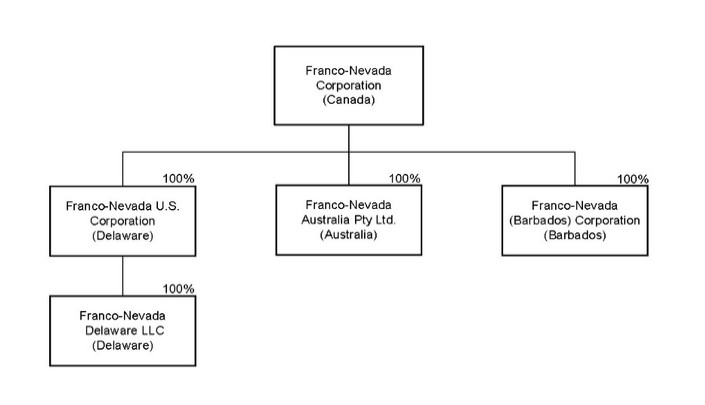rights, and security and remedies. Additionally, Franco-Nevada includes operating covenants (e.g. requirements for operators to conduct operations in accordance with responsible practices and applicable laws) and transfer restrictions in its agreements, intended to ensure that the Company remains partnered with responsible actors when it comes to labour-related issues.
Franco-Nevada is a long-standing member of the World Gold Council and has committed to encourage the adoption of the Responsible Gold Mining Principles (the “RGMPs”) and, although not applicable to Franco-Nevada at this time, ensure conformance with the RGMPs for any gold mining operations over which the Company has direct control. In addition to endorsing and encouraging the adoption of the RGMPs in accordance with the RGMPs guidelines, the Company is committed to expanding awareness and understanding of the RGMPs with the Company’s investees, directors, officers, consultants, shareholders and other stakeholders.
Franco-Nevada is also a corporate participant of the United Nations Global Compact (the “UNGC”), the world’s largest corporate sustainability initiative, whereby the Company is required to submit, on an annual basis, a “Communication on Progress” describing the practical actions that the Company has taken and the qualitative and quantitative results of the Company in furtherance of the UNGC’s Ten Principles, which includes (i) the elimination of all forms of forced and compulsory labour (Principle 4) and (ii) the effective abolition of child labour (Principle 5). Franco-Nevada’s most recent Communication on Progress is available on the UNGC website.
D. | Parts of Franco-Nevada’s business and supply chains that carry a risk of forced labour or child labour being used and the steps taken to assess and manage that risk |
As noted above in this report, Franco-Nevada currently does not operate any of the mining or other assets in which it has royalty, stream or other interests and as such does not directly produce or import goods. Franco-Nevada has also not identified any forced labour or child labour in its activities and supply chains and considers that there is a low risk of forced labour or child labour in its current supply chains given their nature, and the limited size and scope of such supply chains. However, Franco-Nevada recognizes its business model is dependent on the industry operating in a responsible fashion and actively supports the industry in its efforts and initiatives and also has policies in place to mitigate related risks, as outlined above.
E. | Measures taken to remediate any forced labour or child labour |
As Franco-Nevada has not identified any forced labour or child labour or material risks of forced labour or child labour in its activities and supply chains, no measures are required or have been undertaken.
F. | Measures taken to remediate the loss of income to the most vulnerable families that results from any measure taken to eliminate the use of forced labour or child labour in Franco-Nevada’s activities and supply chain |
As Franco-Nevada has not identified any forced labour or child labour in its activities and supply chains, no measures are required or have been undertaken.
G. | Training provided to employees on forced labour and child labour |
Employees are trained annually on the content of, and are required to acknowledge in writing, Franco-Nevada's key corporate policies. As discussed above, these policies address the use and elimination of forced labour and child labour and the training covers such matters.

